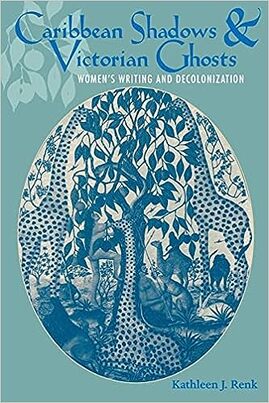|
IN AN ERA of social chaos, religious skepticism, and postrevolutionary fear, the idea of the stable middle-class family acquired a mythical status in nineteenth-century England. This image of the traditional family--based upon the supposed natural superiority of white elders--also served as a paradigm for the relationship of the British to their colonial subjects during the Victorian era.
As this book shows, remnants of this myth live on and are played out in the contemporary Caribbean. In Caribbean Shadows and Victorian Ghosts, Kathleen Renk demonstrates how contemporary Anglophone Caribbean women's writing radically subverts the powerful myth of the family as it is constructed in nineteenth-century British and colonial texts. Reading the fiction of Jamaica Kincaid, Dionne Brand, Jean Rhys, Erna Brodber, and Michelle Cliff alongside British texts such as Dickens's Great Expectations and Brontë's Jane Eyre, she argues that Anglophone Caribbean women writers create new narratives that simultaneously "bury" Victorian ghosts--the discourse on the Victorian mother, the plantation family discourse, and the discourse on madness--and "catch" Caribbean shadows--the histories of forgotten or elided Caribbean ancestors and narratives of resistance. These women writers radically depart from both British and Caribbean literary precursors as they reconfigure Caribbean identity, family, and nation according to cross-cultural, transnational, and transtemporal paradigms. Because it is the first book to examine the vital textual connections between Victorian and Anglophone Caribbean literatures, and because it draws on the work of sociologists, anthropologists, historians, and feminist and postcolonial theorists, the book should have wide-ranging appeal. ISBN 978-0813918358 University of Virginia Press Pub. date: Mar. 29, 1999 Pages (pb): 179 Buy direct from Virginia Press Amazon |
Praise
This book positions itself fluently within contemporary feminist, postcolonial, and Caribbean theorizing around decolonization. Renk avoids jargon, but her discussions demonstrate that she is comfortable situating her work within current theoretical debates. Her argument is well-constructed, easy to follow, and a pleasure to read. - Diana Brydon, University of Guelph
This book positions itself fluently within contemporary feminist, postcolonial, and Caribbean theorizing around decolonization. Renk avoids jargon, but her discussions demonstrate that she is comfortable situating her work within current theoretical debates. Her argument is well-constructed, easy to follow, and a pleasure to read. - Diana Brydon, University of Guelph
